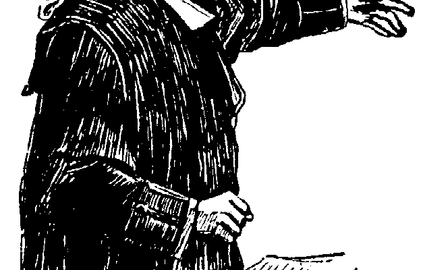The Great American Newspaper Solution: Sue!

The newspapers of yore had two dependable revenue streams: subscribers and advertisers. Today’s broadsheets draw money from the same sources, but funding problems at even the most mainstream papers are commonplace.
Murdoch and his News Corporation, ever the industry leader, have a plan to put content behind paywalls, remove stories from search engine indices, and eventually bring suit against those who reproduce content from News Corp. papers on blogs and websites. Lawsuits of this kind would be based on the violation of fair use, a copyright law that allows the limited reproduction of copyrighted material without the consent of its original producer.
Wired reported last week that a Little Guy has perhaps beaten Murdoch to the punch: Steve Gibson of a Las Vegas firm presumes that there exists inherent value in newspaper copy and evidently has a strict personal interpretation of fair use he is willing to test in the courts. His strategy is to open up a third revenue stream for newspapers, a backdoor one: settlements from copyright infringement suits.
Gibson is now in the business of buying newspapers’ copyrights and then suing when he finds a violation, i.e. when newspaper content is reproduced on a personal blog or website without the newspaper’s consent.
As The Economist said recently about the allegedly bloated American justice system, it seems citizens need a law degree to stay out of jail. In this case, people are perhaps justly surprised when they are slapped with a lawsuit for doing what everyone has been doing for the last decade: reproducing content posted by online newspapers.
Is this the way we want to save newspapers? By suing those who evidently value content enough to reproduce it? When laissez-faire economics leaves a regulation vacuum, the vultures start the circle, looking to pick off innocent prey.
France, for example, has passed legislation regulating Internet downloading. Now, whatever you think of this legislation (follow the link and you’ll see that even the law’s advocates have misgivings about some its directives), it is an attempt made by the government to regulate the Internet. The point is that government action around which there is a conversation is clearer than the imperceptible establishment of legal precedent by clever lawyers.
Let’s not rely a scheme to save news producers, let’s discuss a route to just commerce that will keep people informed and journalists paid to do journalism.
Image courtesy of Wikimedia Commons, user: Tene





